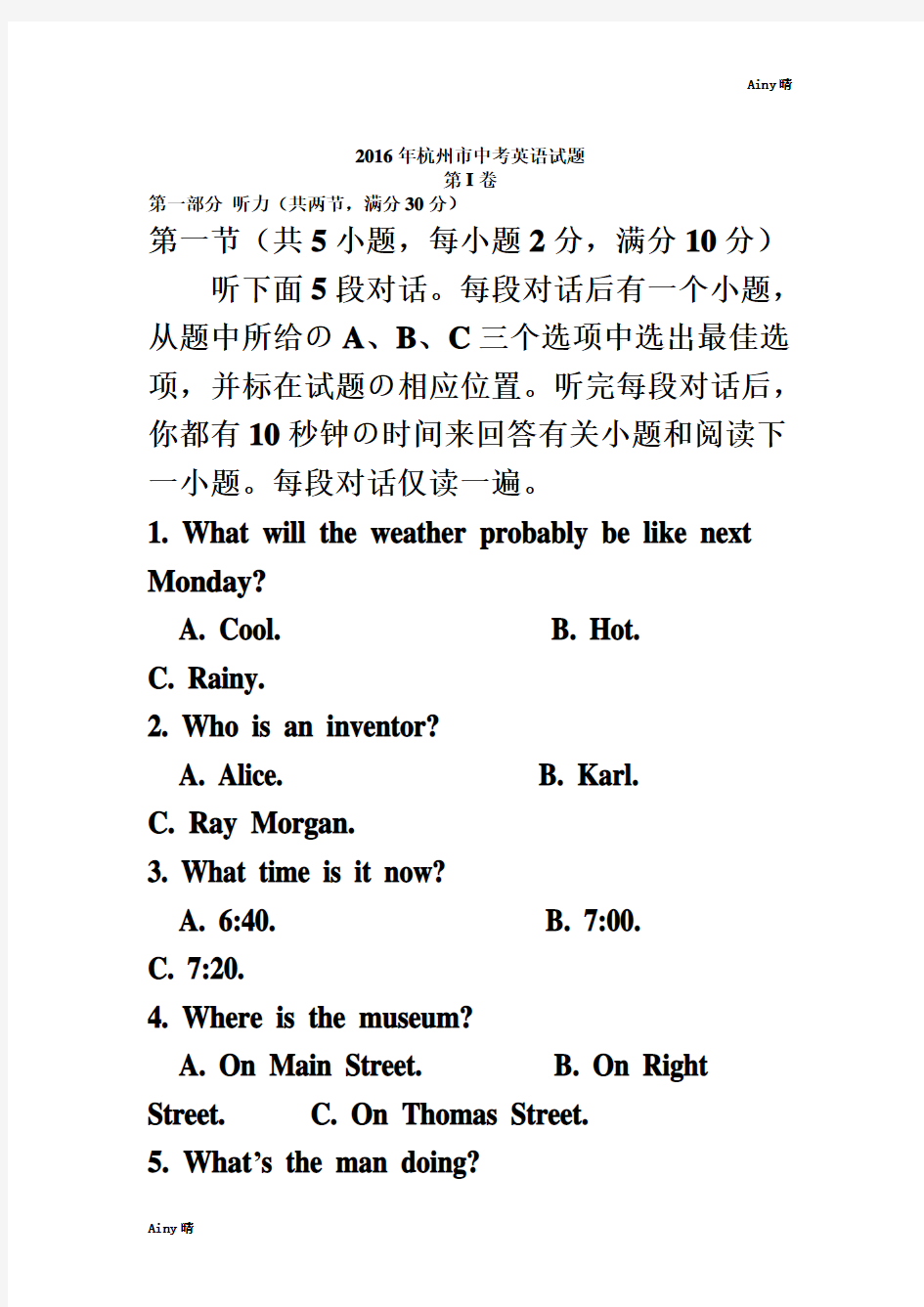2016年杭州市中考英语试题及答案(含听力文本)


2016年杭州市中考英语试题及答案(含听力文本)
2016年杭州市中考英语试题
第I卷
第一部分听力(共两节,满分30分)
第一节(共5小题,每小题2分,满分10分)听下面5段对话。每段对话后有一个小题,从题中所给のA、B、C三个选项中选出最佳选项,并标在试题の相应位置。听完每段对话后,你都有10秒钟の时间来回答有关小题和阅读下一小题。每段对话仅读一遍。
1. What will the weather probably be like next Monday?
A. Cool.
B. Hot.
C. Rainy.
2. Who is an inventor?
A. Alice.
B. Karl.
C. Ray Morgan.
3. What time is it now?
A. 6:40.
B. 7:00.
C. 7:20.
4. Where is the museum?
A. On Main Street.
B. On Right Street.
C. On Thomas Street.
5. What’s the man doing?
听下面一段对话,回答第9至第11三个小题。
9. What kind of music does the man speaker write?
A. Country.
B. Pop.
C. Folk.
10. Where did they give concerts?
A. In theaters.
B. In parks.
C. In schools.
11. How long has he played the piano?
A. Five years.
B. Ten years.
C. Fifteen years.
听下面一段独白,回答第12至第15四个小题。
12. Who made lunch for the family?
A. Her brother.
B. Her sister.
C. Her mother.
13. What food did the speaker take to school for lunch?
A. An egg sandwich, some bread, a banana and a cookie.
B. An egg sandwich, some cakes, a banana
and a cookie.
C. An egg sandwich, some chips, a banana and a cookie.
14. Why didn’t the speaker eat all the food for lunch?
A. Because she didn’t like the food.
B. Because she wanted to lose weight.
C. Because she was busy with her work.
15. What did the speaker do with her lunch in the end?
A. She asked for a different lunch.
B. She threw the food away.
C. She made her own sandwich.
第二部分阅读理解(共两节,满分40分)
第一节(共15小题,每小题2分,满分30分)阅读下列短文,从每题所给の四个选项(A、B、C和D)中选出最佳选项。
A
Rob Frenette had problems with bullies(欺辱)at school for eleven years. He was often lonely and scared. When he was fifteen, however, he decided to do something about his problems.
He walked into a newspaper office and told them about the bullying. His story went into the newspaper and soon all the TV stations in Canada wanted to talk to him about his experiences. They also wanted to hear his ideas to stop bullying.
After that, Rob continued his studies at school, but in his free time he helped other people with bullying problems. With a friend Katie Neu, he made a website called www. Bullyingcanada.ca. Visitors to the website can find advice, stories and poems about bullying, in both English and French. When people are upset, they can talk on the phone or online to Rob and his team. Every weekend Rob has to answer e-mails to the website. He also speaks to children, teachers and members of government around the country about bullying.
Rob’s most important message is: “When bullies are unkind to you, it isn’t your fault. There’s nothing wrong with you, so you should try to keep trusting yourself. And remember
that people care about your problems. You just have to find those people.”
One of Rob’s ideas is “Blue Day”, a special day for stopping bullying in schools. Students have to wear blue clothes and in class they learn how to stop bullying. More than 150 Canadian schools now celebrate Blue Day, but Rob won’t stop until ther e’s a Blue Day in every school in Canada.
16. How did Rob often feel at school before he was fifteen?
A. Relaxed.
B. Unhappy.
C. Shocked.
D. Tired.
17. We can learn from this passage that Rob suffered from bullying since he was _______.
A. four
B. seven
C. eleven
D. fifteen
18. www.bullyingcanada.ca is a website where people can _________.
A. learn how to write poems
B. get advice about bullying problems
C. get blue clothes for free
D.
